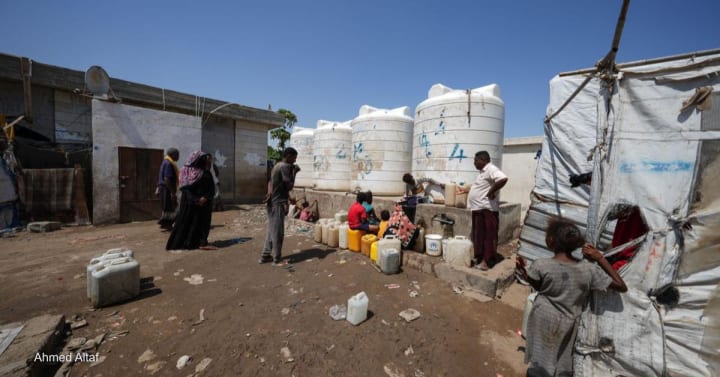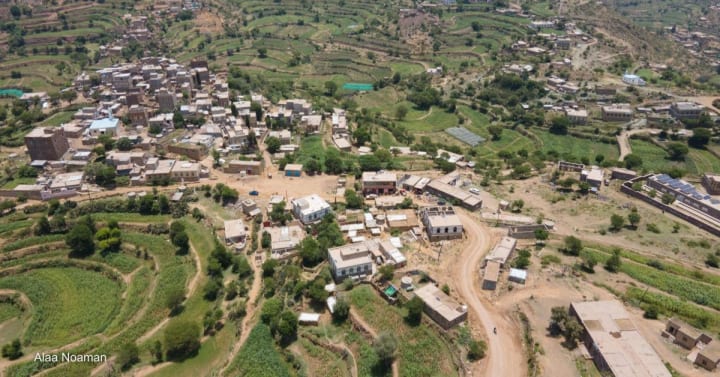
Climate change is one of the defining existential challenges of our time. According to the United Nations Secretary-General António Guterres, we have crossed the threshold from an era of global warming to one of global boiling; people across the world are suffering from the dramatic consequences of intense heatwaves, droughts, and cataclysmic fires and floods, with livelihoods and homes destroyed and loved ones lost.
For the almost 2 billion people living in fragile and conflict-affected states, the consequences are even more severe and profound. For example, in Yemen, an extremely arid country that has been ravaged by eight years of conflict, the resilience to withstand the shocks of such violent weather events and subsequent supply disruptions is deeply lacking. Recent heavy flooding has therefore exacerbated one of the world’s worst humanitarian crises, worsened food insecurity, and inflicted further damage on the country’s already weak economy.
With 2023 set to be the hottest year since records began, and no indication that this upward trajectory will abate in 2024, we can expect fragility and climate vulnerability to become increasingly synonymous. Swift and comprehensive action is required to mitigate the impacts of climate change and invest in projects that build resilience and support long-term sustainable development in fragile and conflict-affected states.
Private-sector climate action is fundamental to drive sustainable development
The private sector has a crucial role to play in driving forward progress by implementing climate-progressive policies, sharing expertise and knowledge, and helping to secure investment for long-term programs in close partnership with local and international actors.
HSA Group is the largest private company in Yemen, a dangerously climate-vulnerable country, so we recognize our responsibility to step up and help respond to environmental crises. For 85 years, we have been guided by the philosophy set down by our founders — a belief in doing well by doing good — and we are firm advocates of purpose-led and responsible business. We are responding to climate change by minimizing and mitigating the environmental impacts of our own operations, implementing projects that provide immediate support to vulnerable communities, and working closely with partners to help create a sustainable and resilient future for all.
HSA Group conducted a carbon footprint baseline assessment in 2022 to underpin its decarbonization road map, for which reducing waste and investing in renewable alternatives will remain a key focus. To achieve a more sustainable and circular business, and preserve precious resources, we have implemented innovative technologies to minimize the waste created by our products and operations.
This includes the recent installation of waste heat recovery systems that will limit HSA Group’s usage of coal by 12-15%, according to internal data collated by the organization. We are also in the process of adapting our existing facilities to utilize solar energy to power our operations and physical infrastructure and exploring geothermal energy to maintain base power at our plants and provide thermal heat for production processes. To share our expertise with our partners, we established the renewable energy company Innovative Efficient Solutions, or IES, in 2019, through which we have facilitated partners’ reduced energy use and investment in sustainable energy generation and water consumption.

Outside of our own operations, HSA Group has invested in short- and medium-term projects to help alleviate the dire situation on the ground in Yemen, where 55% of people do not have access to clean drinking water and extreme weather events have reduced already diminished agricultural yields. Through an extensive water, sanitation, and health program, HSA Group supported approximately 250,000 beneficiaries in 2022 alone.
Our initiatives have included a water trucking project that has delivered almost 2 billion liters of clean water to those in need and funding and managing over 800 water infrastructure rehabilitation projects across Yemen. We have also invested in building wastewater treatment facilities, solar-powered pump systems for irrigation, and Yemen’s first large-scale desalination plant — all of which support sustainable agricultural activity and will play a key part in reducing the country’s dependence on imports for food.
These endeavors are crucial to help transform the future of fragile and conflict-affected states such as Yemen. However, they require significant upfront investment, and access to finance is hindered by the perceived risks associated with such markets and limited coordination among relevant partners. Largely excluded from global financial markets and with limited credit and currency available, Yemen’s private sector cannot implement projects to drive forward sustainable development alone. Therefore, coordination with international organizations and government entities is necessary.
Mobilizing essential climate finance requires public-private collaboration
HSA Group’s successful collaboration with the International Finance Corporation in 2021 provides an example of the power of partnership. Securing a $75 million financing package using blended finance enabled development finance institutions including Proparco and FMO to invest in the Yemeni market for the first time and provided capital to supply vulnerable communities with staple foods.
Similarly, HSA Group is co-supervising and co-funding a study with the embassy of the Netherlands in Yemen to determine how the private sector can most effectively and impactfully partner with the Food and Agriculture Organization’s Watershed Development Project in Wadi Al Hajar, Yemen. The project is combining local and international resources to achieve sustainable, resilient, and equitable watershed management.
As climate finance pledges falter at COP 28, can JETPs deliver?
Vietnam’s $15.5 billion JETP agreement, details of which were unveiled on Friday, is unlikely to be followed by more. But experts say we shouldn’t write off the climate financing model just yet.
Most recently, we were delighted to announce an effective coordination mechanism with Yemen’s Environment Protection Authority, or EPA, and Climate Change Unit, or CCU, at the U.N. climate conference COP 28. EPA oversees CCU and serves as the national focal point of the U.N. Framework Convention on Climate Change and its multilateral climate finance mechanisms.
The establishment of a formal platform for collaboration and joint advocacy will augment the climate finance mobilization efforts required to tackle climate change concerns in Yemen and promote and support development projects that will help progress the green transition and build climate resilience in the country. Under this coordination mechanism, HSA Group will work with EPA and CCU to further integrate and implement policies in line with the Sustainable Development Goals and the 2015 Paris Agreement. EPA and CCU will also coordinate with HSA Group to support the latter’s accreditation with multilateral climate funds, which will provide direct access to climate finance allocations; and capacity will be developed within both HSA Group and CCU to enable close collaboration on joint programs.
The need to tackle climate change is essential and urgent and requires multipartner commitments, from individuals to large corporations to government entities and international organizations. With local knowledge, contacts, and resources, the private sector is well positioned to implement policies that can reduce the impact of its activities and help support climate-vulnerable communities. By working together with partners to mobilize climate finance, we can address these most pressing challenges today, while investing in solutions that will build resilience and a sustainable future for generations to come.
For more information about HSA Group’s work, visit our website.




